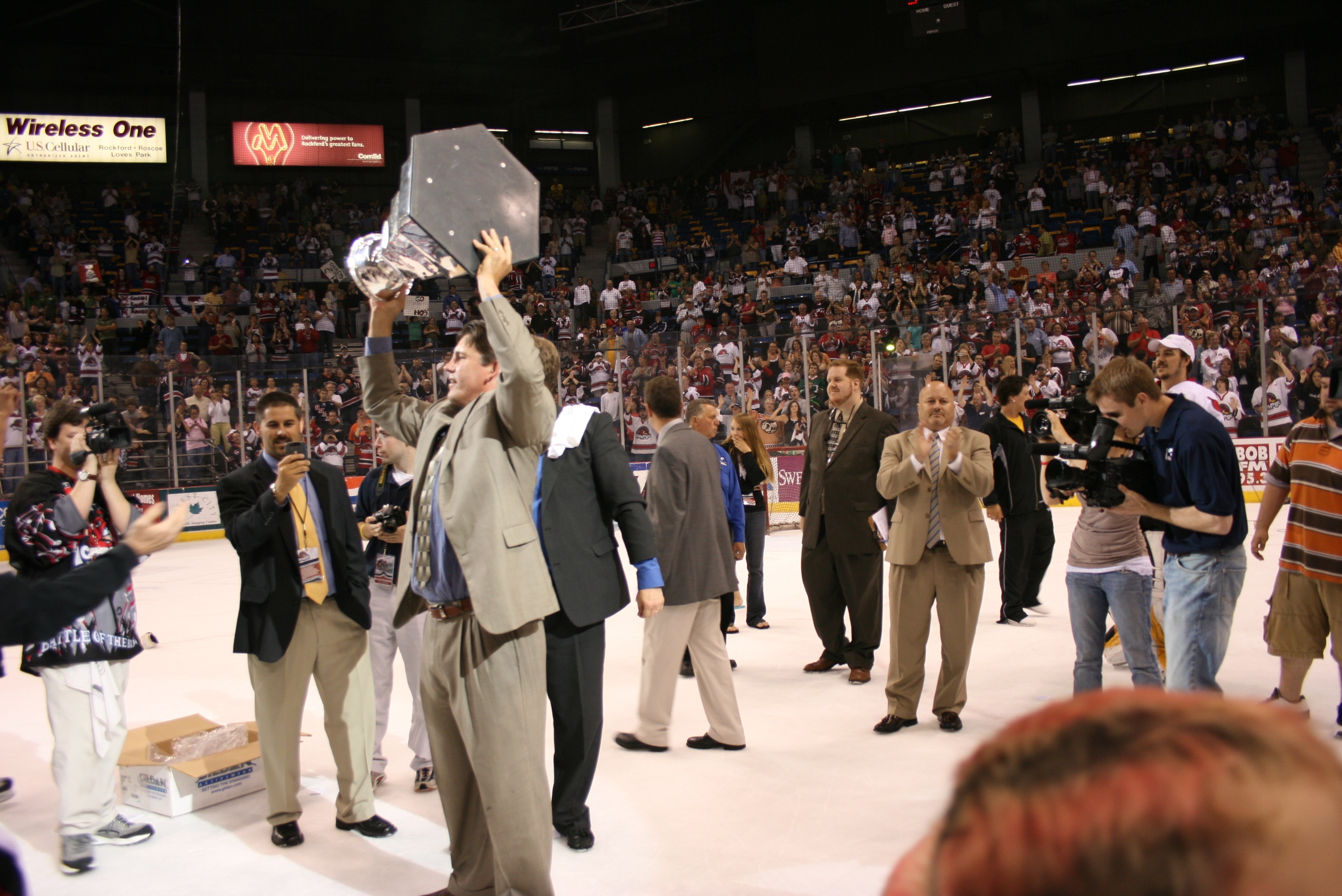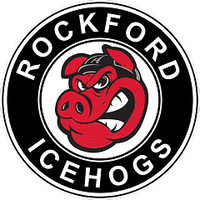
FEATURE: Steve Martinson - Turning Toughness into Winning
Nobody ever had to wonder if Steve Martinson was tough. As a player, he made himself a force on the ice and battled his way to the NHL. As a coach, he won 10 league championships across three teams in four leagues by instilling that toughness into his players. In Rockford, his rough and tumble group brought the city its first hockey championship in 2007 when his IceHogs won the Colonial Cup.
On Saturday, Mar. 23, the IceHogs will induct their cup-winning coach into the team’s ring of honor with a special ceremony during the first intermission. His legacy in Rockford mirrors that of his illustrious coaching career: a winner defined by toughness and his commitment to pull the best out of his players.
“You can’t win with just skill,” said Martinson. “You have to have a good mix, you can’t win with just physical players. And the key to intimidation in hockey is to be able to hit the good players. So the guys who can skate and hit, even today, are still super valuable.”
Throughout a 14-year playing career (including two seasons when he played in at least one game as a coach of a team), Martinson racked up 2,754 penalty minutes and was known as one of the toughest players on whatever team he skated for. In an era when fighting was more common and the last two minutes of a blow-out often took 20 minutes to finalize, Martinson played the game as hard and as physical as anyone. He led his team in penalty minutes on three occasions, including in 1985-86 with the Hershey Bears when he not only led his club with 432 PIM, but also the entire league (Peter Bakovic, the next closest, had 349).
Even though he could stand toe-to-toe with many of the toughest fighters in the hockey world during a punishing age, Martinson was not simply a brute. After just one full year off from playing, he dove headfirst into coaching with the San Diego Gulls of the West Coast Hockey League in 1995-96. Coaching in the WCHL took a lot more than hockey X’s and O’s acumen, but a high level of organization as well. In his first year as a head coach, Martinson manned the bench by himself without an assistant and also served as the team’s general manager.
Martinson wanted his teams to play the way he played; tough, physical, and with boundless commitment. It quickly became apparent that to play for Steve Martinson, toughness was a mandatory prerequisite.
“To me, it’s the most entertaining way to play- a physical style.”
In the ’95-96 season, Martin St. Amour led Martinson’s Gulls in scoring, but also ranked second in on the team in penalty minutes with 182. Brad Belland, the team’s second leading scorer, contributed 117 penalty minutes. Martinson also brought in Chad Wagner who paced the club with 289 PIM in just 45 games. It was not an accident that San Diego both dominated the WCHL and led the league with 1,790 penalty minutes that season. In his first season behind the bench of a pro team, Martinson guided the Gulls not only to the league championship, but also to a towering 49-7-2 record. The 1995-96 Gulls team was the first of many championships for Martinson as a coach, but it also patented his winning blueprint for years to come.
In 1996-97, Martinson followed that blueprint and produced identical results. Once again, his rough and tumble squad bullied their way to a second WCHL championship behind 2,571 penalty minutes to lead the league again. Five of the top six Gulls scorers racked up at least 100 penalty minutes, and Wagner led the league with 503. San Diego finished with a record of 50-12-2. In his two first years as a head coach, Martinson had won two titles and ran through the league both times with teams that mirrored their head coach’s style.
Martinson’s coaching success continued, and he went on to win three more championships with the Gulls at the end of the 1997-98, 2000-01, and 2002-03 seasons. After the fifth title, the WCHL was absorbed by the East Coast Hockey League in 2003, but Martinson’s success continued despite the league change. In San Diego’s first ECHL season, the Gulls won the Pacific Division title with a record of 49-13-10 before falling in the opening round of the playoffs.
In 2004, Martinson arrived in Rockford. When the Minnesota native first reached the Stateline, the Hogs had missed the playoffs in three of the last four seasons and were coming off a campaign in which the team finished fifth out of six teams in the Western Conference with a 28-43-5 record.

In his first season with Rockford, Martinson quickly turned the ship around. The IceHogs finished second in the Western Division with a 46-25-9 record, led the division with 2,243 penalty minutes, and reached the second round of the playoffs (a new team best). His first campaign in the Forest City ended with a crushing Game 7, 2-1 overtime loss to the Fort Wayne Komets after the IceHogs led the series three games to one.
Eager to for redemption and another postseason run, the 2005-06 team reached the second round for the second straight season and featured favorites like Preston Mizzi (38G, 35A…and 150 PIM) and Olivier Proulx (20G, 44A…and 198 PIM). Robin Big Snake led the team and the UHL with 423 penalty minutes (Mat Goody for Richmond, the next closest, had 322), and was the chief bruiser on a team that finished with a league-high 2,592 PIM. More than just a scrapper, Big Snake also finished seventh in team scoring with 46 points (27G, 19A). Martinson’s most productive players were also often some of the hardest to play against.
Martinson’s style also had a way of bringing out the best in players who had been passed over by other coaches. Chaz Johnson bagged 23 goals and 248 PIM for Rockford during his rookie year in 2005-06 and became a winning piece for the Hogs.
“Having Marty as my coach my first year was amazing because he did what a lot of coaches prior didn’t do, which was give me a legit opportunity to play my game,” said Johnson. “He allowed me to be me. He always breathed a lot of confidence in myself, and it really helped me a lot in my career. I never had over 20 goals in juniors, and then I get to pro and I think I scored over 20 my first year, and that’s all because of Steve and the confidence he had in me and just allowing me to play.”
Kevin Ulanski was second in scoring on Rockford’s Colonial Cup team in 2006-07 with 66 points (20G, 40A) in 61 games, and he understood Martinson’s creed of toughness.
“An old college teammate of mine was like, ‘If you play hard, he’ll love you a ton,’” recalled Ulanski. “Marty likes tough, hard, physical games. And I was far from being a tough guy, but I felt like I played the game hard and got more playing time because of it and enjoyed all my time with him.”
In 2006-07, Martinson’s IceHogs began the year 2-3-0 and milled about in the middle of the standings until the second half of the season. Rockford then ripped off nine wins in a row from Feb. 16 to Mar. 3 to leap ahead in the standings and solidify second place in the standings with a 48-21-7 record. Once again, the group led the league in penalty minutes with 2,132.
“I'll tell you one thing, you don't want to play against our team because we got a tough, physical team, and we'll be chasing after you all game,” laughed Ulanski.
“That Rockford team is kind of the epitome of it. We had a really fun team to watch, and it was a fun team to coach,” recalled Martinson.
After smashing through the first two rounds of the postseason against Quad City and Fort Wayne, winning each series four games to one, Rockford faced the Kalamazoo Wings in the Colonial Cup Finals. “We had so much talent,” remembered Johnson. “But we had so much toughness, too.”
As the story goes, Jason Notermann scored the go-ahead goal for Rockford in Game 7 of the Colonial Cup Finals against Kalamazoo, and Nicolas Corbeil scored the clincher late in the third. Rockford captured its first championship, and Martinson won his sixth cup.
Martinson’s legacy of winning continued beyond the Stateline. When the IceHogs transitioned to the AHL immediately following the championship season in 2007-08, Martinson moved on to coach the Elmira Jackals in the ECHL. Several of the top players, including Johnson and Ulanski, on Rockford’s cup-winning team from the year before followed him there, but it wasn’t just because of the winning that Martinson’s coaching brought. Players followed Martinson because he also worked diligently to find them opportunities in at the next level in the American Hockey League.
“Marty did more for me than my agent at the time,” said Johnson. “Marty got me to my first NHL camp in Ottawa. I remember talking to Ottawa, and I had mentioned my agent. They were like, ‘We talked to Steve Martinson.’ They had no idea who my agent even was.”
Others received the same treatment. Ulanski saw his first AHL action in the 2006-07 season with the Milwaukee Admirals thanks to Martinson’s work behind the scenes.
“For me, and especially in the minor league type scenario, he took on the role of coach, GM, and partially agent for myself,” said Ulanski. “He was all about winning championships but also moving people on, which is rare back then in the Untied Hockey League. That’s one thing he kind of promised me when trying to get me to Rockford was, ‘Hey, my goal is to get you X amount of games in the American Hockey League,’ and he did. Then that’s why I ended up following him to Elmira the following year, as well. He was really good about it.”
Eventually Martinson would go on to establish a winning dynasty with the Allen Americans, first in the Central Hockey League and then in the ECHL. Martinson’s 2012-13 and 2013-14 Allen clubs won back-to-back Ray Miron President’s Cups before the CHL folded in 2014. When the Americans joined the ECHL, Martinson kept winning and became the first ECHL club to pull off back-to-back Kelly Cup Championships following the 2014-15 and 2015-16 seasons. The only other North American professional hockey teams to win four consecutive league championships are the Montreal Canadiens from 1956 to 1960 (won five), the Canadiens again from 1976 to 1979, and the New York Islanders from 1980 to 1983.
Martinson stayed in Allen from 2012 until his final season with the team in 2021-22. When the dust settled on his last campaign with the Americans, his 1,123 wins ranked second behind only Scotty Bowman in professional hockey history. He ranks first amongst American-born coaches in the category.
His legacy in Rockford is capped by bringing the city its first hockey championship in 2007, but his impact expands far beyond a Colonial Cup with the IceHogs. Martinson won everywhere he went, and his teams played with the same toughness that he exhibited as a player. He piloted teams to championships while still promoting his players and helping them fulfill their individual goals of reaching the next level of their game. His players followed him to different teams, they followed him to league titles, and the IceHogs followed him to their first championship in team history.




